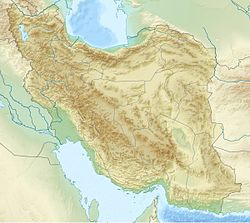Gargar River
Appearance
(Redirected from Gargar (River))
You can help expand this article with text translated from the corresponding article in Persian. (January 2021) Click [show] for important translation instructions.
|
| UNESCO World Heritage Site | |
|---|---|
 | |
| Location | Shushtar County, Khuzestan Province, Iran |
| Part of | Shushtar Historical Hydraulic System |
| Criteria | Cultural: (i), (ii), (v) |
| Reference | 1315 |
| Inscription | 2009 (33rd Session) |
| Area | 240.4 ha (594 acres) |
| Buffer zone | 1,572.2 ha (3,885 acres) |
| Coordinates | 32°3′2″N 48°51′6″E / 32.05056°N 48.85167°E (beginning point)[1] |


Gargar River, (Persian: رود گرگر) is a man-made canal which is a world heritage site and a part of Shushtar Historical Hydraulic System, located in the island city Shushtar, Khouzestan, Iran from the Sassanid era. Gargar River was registered on UNESCO's list of World Heritage Sites in 2009 and is Iran's 10th cultural heritage site to be registered on the United Nations' list together with the 12 other historical bridges, dams, canals, watermills and buildings as Shushtar Historical Hydraulic System.[2][3][4][5][6]
References
[edit]- ^ Shushtar Historical Hydraulic System, World heritage nomination document,2008
- ^ "Shushtar Historical Hydraulic System".
- ^ "Shushtar Hydraulic System: The Oldest Engineering Masterpiece in World - Tourism news". Tasnim News Agency.
- ^ "Water and water supply technologies in ancient Iran". Evolution of Water Supply Throughout the Millennia (PDF). IWA Publishing. 14 April 2012. pp. 92–126. ISBN 9781843395409.
- ^ https://whc.unesco.org/document/152341 [bare URL PDF]
- ^ SHUSHTAR HISTORICAL HYDRAULIC SYSTEM, World heritage nomination document,2008

